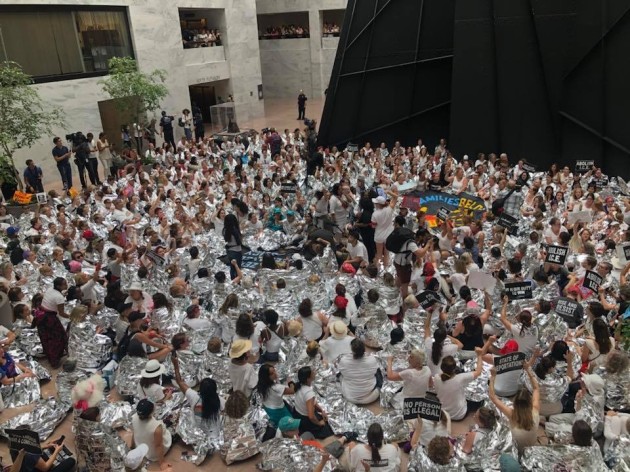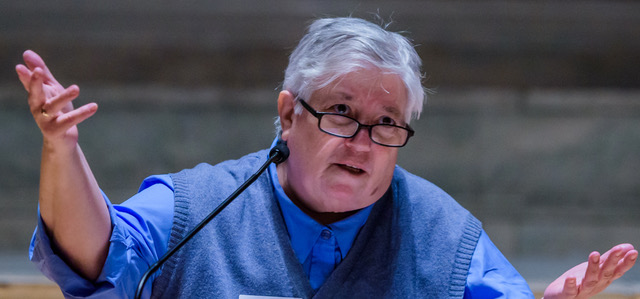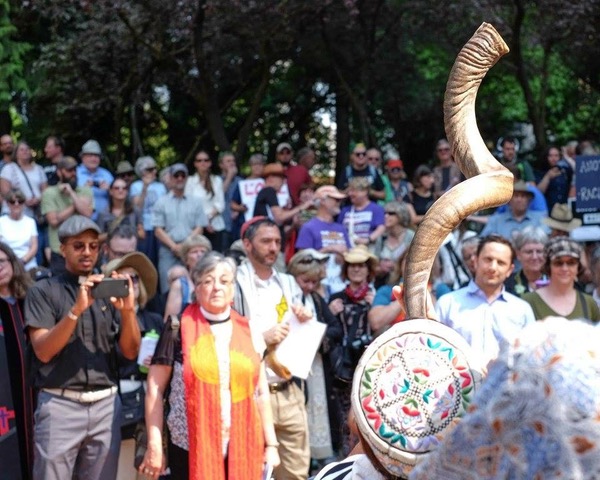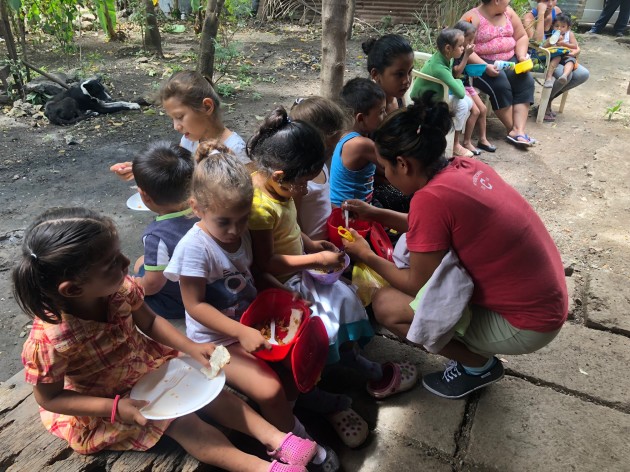Author Archives: Eleanor J. Bader
November 20, 2018 by Eleanor J. Bader
Lovingly Skewering The Liberal Elite
When Elly Lonon and Joan Reilly got word that powerHouse Books wanted to publish their graphic novel, Amongst the Liberal Elite: The Road Trip Exploring Societal Inequities Solidified by Trump (RESIST), in January 2018, they were absolutely thrilled.
But then reality barged in.
 Not only did the publisher want the book completed in just five month to peg the book’s release to the midterm elections—but the same week that they signed the contract, Reilly was diagnosed with an aggressive form of brain cancer that necessitated surgery, radiation, and chemo.
Not only did the publisher want the book completed in just five month to peg the book’s release to the midterm elections—but the same week that they signed the contract, Reilly was diagnosed with an aggressive form of brain cancer that necessitated surgery, radiation, and chemo.
“Our mantra,” Lonon told Lilith, “quickly became, ‘don’t let the perfect be the enemy of the good.’” She spoke by phone with Lilith in early November and covered the book’s evolution and its hilarious depiction of Alex and Michael, a well-meaning, straight, white couple who are nonetheless often clueless about their class and race privilege.
- No Comments
August 28, 2018 by Eleanor J. Bader
The Radical Potential of Fresh Food — and Why It Can Be So Hard to Come By
 Ask Julia Koprak, Senior Associate at The Food Trust, an organization dedicated to ensuring that US residents have access to affordable, nutritious food, about the most surprising aspect of her work, and her answer is immediate. “People assume that folks need to take personal responsibility and eat healthy meals,” she says. Missing, she continues, is recognition of the fact that many US residents live in areas where grocery stores are few-and-far-between and farmer’s markets are either non-existent or unreachable, sometimes referred to as “food deserts.” “These areas exist in virtually every city and state in the country,” Koprak continues. “There are lots of places where people have to take three buses or drive 30 miles for food, places where the only nearby place to buy groceries is the gas station.”
Ask Julia Koprak, Senior Associate at The Food Trust, an organization dedicated to ensuring that US residents have access to affordable, nutritious food, about the most surprising aspect of her work, and her answer is immediate. “People assume that folks need to take personal responsibility and eat healthy meals,” she says. Missing, she continues, is recognition of the fact that many US residents live in areas where grocery stores are few-and-far-between and farmer’s markets are either non-existent or unreachable, sometimes referred to as “food deserts.” “These areas exist in virtually every city and state in the country,” Koprak continues. “There are lots of places where people have to take three buses or drive 30 miles for food, places where the only nearby place to buy groceries is the gas station.”
- No Comments
July 20, 2018 by Eleanor J. Bader
Marilyn Sneiderman on Finding Optimism and a Life of Labor Organizing

“You have to be an eternal optimist to be a community and labor organizer,” Marilyn Sneiderman, Executive Director of the Center for Innovation in Worker Organization, says with a laugh. “You have to believe social change and social justice are not just some distant hope, but are something we can win through our day- to-day organizing and vision of a more just world.”
Sneiderman spoke to Eleanor J. Bader several days after she was arrested—along with more than 600 women from throughout the country—at a sit-in at the Hart Senate Office Building in Washington, DC. The action was called to protest the family separation and incarceration policies of US Immigration and Customs Enforcement (ICE).
- No Comments
July 11, 2018 by Eleanor J. Bader
An Artist Who Welds Jewelry, Glass and Performance Together

As a little girl growing up on the outskirts of Durham, North Carolina, multidisciplinary artist Rachel Rader loved hearing—and eventually reading—all kinds of stories. She was especially fascinated by biblical narratives—she found the details of the flood myth and Noah’s creation of an ark particularly compelling. By the time she enrolled in Virginia Commonwealth University (VCU) in 2002, the Material Studies major decided to minor in Comparative Religion.
“I grew up going to a Conservative temple and always wondered what it meant that some people took biblical stories literally,” she begins. “Lately, I’ve been researching how myths repeat around the world, how they’re interpreted and presented by different cultures and religions, how they align and differ. That’s the inspiration behind my current effort, Ancient Truth Investigators, an ongoing, multi-dimensional art project that incorporates performance, sculpture, jewelry, and other materials.”
- No Comments
June 24, 2018 by Eleanor J. Bader
A Bold Photographer Who Captures Social Justice Movements
For as long as she can remember, photojournalist Natalie Keyssar has been interested in the causes and casualties of violence and civic unrest. But it took years for her to muster the courage to pursue this particular angle; first, she covered metropolitan news and youth culture for the Wall Street Journal and a wide array of online and print outlets. Over her career, she has covered major neo-Nazi rallies, Kosher soup kitchens, tragic accidents and Occupy protests.
As the International Center of Photography’s Infinity Emerging Photographer Award winner, her eclectic work now appears regularly in Time, Bloomberg Business Week, the New York Times newspaper and magazine, and California Sunday, and has won plaudits not only from the ICP, but from the Aaron Siskind Foundation, PDN30, The Pulitzer Center, and the International Women’s Media Foundation.
Nailing 33-year-old Keyssar down for an interview took months—she is on the road for much of the year—but she and reporter Eleanor J. Bader recently met at a Brooklyn café where they spent several hours talking about Keyssar’s career, its unlikely trajectory, and her interest in covering movements for social justice at home and abroad.
- No Comments
June 4, 2018 by Eleanor J. Bader
This Radical Medical Collective Ministers to Protesters
Almost a decade ago, a group of healthcare activists in Portland, Oregon, formed the Rosehip Medic Collective, with the original intent of providing emergency medical care to people attending progressive political events, protests and direct actions. As part of this work, they’ve offered intensive trainings––a 20-hour immersion in advanced first aid––so that people who either lack the resources to obtain medical attention or who feel unsafe in traditional medical settings might have access to basic information, advocacy, and support.

The collective’s members—many of them Jewish and most LGBTQ—include Emergency Medical Technicians, registered nurses, wilderness first-responders, herbalists, naturopaths, acupuncturists, and teachers. This diversity of experience has led them to a range of Portland events. Individual members also provide care to people living on the street, to IV drug users in harm-reduction settings, and in free clinics. And some Collective members were present at the 2017 Standing Rock encampment formed by North Dakota’s native community in opposition to the Dakota Access Pipeline.
Rosehip Medic Collective member Eva Irwin spoke to Eleanor J. Bader by phone in early May about the group’s work and evolution.
Eleanor J. Bader: Let’s start with some history. How, when, and why did the Collective form?
Eva Irwin: We basically coalesced as a Collective in the aftermath of the Republican and Democratic conventions of 2008. At both conventions, protesters met tremendous repression. The police violence served as a crucible for us as individuals.
From the beginning—we incorporated in 2008—we’ve included people with and without medical certifications and licenses. Early on, we were EMT heavy, and many of us had gone to wilderness first-responder trainings. Some of us knew a lot about acupuncture and herbs; others were experts in naturopathic medicine. A few of us had been street medics before, with an earlier incarnation of Rosehip called Portland Street Medics, so we came into the Collective with a variety of backgrounds.
The idea was that we wanted to do action/activist medicine. We understood that many communities have to create their own medical infrastructure, taking care of themselves, because of racism, sexism, homophobia, or transphobia. Many of us in the collective have not felt safe accessing conventional emergency medical services (EMS). This led us to do a research project on tried-and-existing alternatives to EMS. One group we profiled was Hatzolah—a global Jewish volunteer ambulance organization which basically recognized that specific communities with specific needs do not always get their needs met by the larger society. Hatzolah was a response to this, a community-created service to care for community members, broadly speaking.
- No Comments
May 16, 2018 by Eleanor J. Bader
Leslie Cagan’s Half-Century of Activism
When Brooklyn for Peace named community organizer Leslie Cagan one of three Pathfinder for Peace award winners in late 2017, it was both in recognition of, and in gratitude for, Cagan’s more than 50 years of social justice activism. Whether pushing for action on climate change, peace, LGBTQ equality, feminism, reproductive choice, or fighting racism, Cagan’s voice, presence, and expertise have long been visible.
Cagan has worn a lot of hats over the years. Among them, she was the interim board chair at the Pacifica radio network in the late 1990s; was National Coordinator of United for Peace and Justice from 2002-2009; and either coordinated or played a leadership role in some of the largest demonstrations in American history—for nuclear disarmament in 1982; for LGBTQ rights in 1987; against the war in Iraq in 2003; and for climate action in 2014.

Opening comments from Leslie Cagan, a leader in the Peoples Climate Movement NY – Peoples Climate Movement 2018 Kick-off event is a city-wide organizing meeting on learning how you can get more involved in climate campaigns. Followed by brief updates on the exciting work of several campaigns and breaking groups focused on how we can strengthen and expand climate action in New York City and NY State, as well as nationally. (Photo by Erik McGregor)
She is presently involved with the Peoples Climate Movement (PCM)—NYC, as well as PCM nationally, and is part of an effort challenging the corporate saturation and over-policing of the Heritage of Pride parade held annually in NYC to commemorate the 1969 Stonewall rebellion.
Cagan recently spoke to Eleanor J. Bader about her history, ongoing work, and the personal challenges of caring for life partner Melanie Kaye/Kantrowitz, who has advanced Parkinson’s Disease.
Eleanor J. Bader: Let’s start with your personal history. When did you become involved in progressive political activism?
Leslie Cagan: I grew up in the Bronx, in a Jewish, leftist community. My parents were hardcore activists. I have an older brother and a younger sister and family outings growing up would often involve going to a demonstration. My grandmother was active in the textile workers union so I guess you can say that politics has always been in my blood. Their example was important and impacted all of us. Both of my siblings are activists. (more…)
- 2 Comments
April 23, 2018 by Eleanor J. Bader
Meet the Feminist Rabbi Confronting Portland’s “Alt-Right” in the Streets

Rabbi Ariel Stone sounds the shofar at a gathering of the Portland Interfaith Clergy Resistance last August.
Despite its reputation as an environmentally conscious, progressive Mecca, in actual fact, the Pacific Northwest has a sordid racial history.
For example, from 1857 to 1927, there was a prohibition on African Americans entering Oregon, and while the policy was reportedly inconsistently enforced, the fact that it was included in the state Bill of Rights sent a clear message to would-be settlers of color. Not surprisingly, Portland remains the whitest big city in the U.S. of A.
For some Oregonians, this is exactly as it should be, and they are mobilizing supporters of a racist, sexist, homophobic and anti-Semitic worldview. The goal? To build all-white ethno-settlements in Idaho, Oregon, Washington state, and western Montana.
Their groups include True Cascadia, which bills itself as “white, proud, and unapologetic.” Supporters have postered numerous areas of the “beaver state,” and declared their intention of “securing the existence of our people and a future for white children.”
And they’re not all talk. In May 2017, 35-year-old white supremacist Jeremy Christian fatally stabbed two men who were defending a pair of girls against racist and anti-Muslim taunts aboard a Portland MAX train.
This is, of course, horrifying. But as you’d expect, many people on Oregon and throughout the Pacific Northwest oppose the alt-right and numerous anti-racist groups which have formed, among them, The Cascadian Coalition Against Hate, Cascadian Anti-White Supremacy, and the Portland Interfaith Clergy Resistance.
Rabbi Ariel Stone of Portland’s Congregation Shir Tikvah is the convener of the Clergy Resistance. She recently spoke to Eleanor J. Bader about the political climate in Oregon, the work of the Clergy Resistance, and the challenges of organizing in Trumpian times.
- 2 Comments
March 26, 2018 by Eleanor J. Bader
This Writer-Attorney Is Fighting to Get Rid of the Tampon Tax

Jennifer Weiss-Wolf at the Coney Island Polar Bear Swim.
Every January 1st, writer-attorney Jennifer Weiss-Wolf jumps into the Atlantic Ocean in a ritual sponsored by Brooklyn’s Coney Island Polar Bear Club. “The camaraderie is almost inexplicable,” she writes in the Introduction to Periods Gone Public: Taking a Stand for Menstrual Equity (Arcade Publishing, 2017). “People think it’s crazy. And maybe it is. But it’s actually a very proactive, symbolic way to set an intention and direction for the remaining 364 days of the year.”
Such plans, of course, are all well and good, at least until serendipity enters the mix.
To wit: Three years ago, a few hours after Weiss-Wolf’s 2015 New Year’s Day plunge, she found her gaze turning in an unexpected direction. The reason? An email seeking donations of tampons and sanitary pads for distribution at a local food pantry.
“I was immediately captivated and curious—and honestly, even mildly ashamed, that I’d never, ever, considered this before,” she wrote. “A self-aware, self-professed feminist, I’d marched on Washington, volunteered as a rape crisis advocate and abortion clinic escort, and worked professionally as a lawyer and writer for social justice organizations. How had I managed to completely overlook this most basic issue?”
That question precipitated an avalanche of others and, in short order, Weiss-Wolf was investigating why millions of women throughout the world—in places like Bangladesh, India, Kenya, Nepal, Uganda and the United States of America—often lack access to an adequate supply of pads and tampons.
Weiss-Wolf sat down with Eleanor J. Bader to discuss her work on a cold, mid-March Monday. The interview took place in Weiss-Wolf’s office at the Brennan Center for Justice, where she is Vice President for Development.
- No Comments
March 12, 2018 by Eleanor J. Bader
Sandinistas and the Upper West Side

Members of the Women’s Network provide meals for children in Tipitapa, Nicaragua. The Women’s Network is run by Nicaraguan women and aims to not rely on international donations.
For more than 30 years, social justice activist Donna Katzin has participated in a Sister City project that links Manhattan’s Upper West Side and Tipitapa, Nicaragua. The relationship has primarily involved raising money for programs that help impoverished children eat at least one nutritious meal per day. It’s a daunting undertaking, since between 25 and 30 percent of the country’s residents live on a daily income of less than two U.S. dollars. online casino singapore
Even more challenging, Katzin and Tipitapa Partners understand that Nicaragua’s feeding centers need to reduce their reliance on international largesse. This is why they are working with the newly formed Women’s Network/Red de Mujeres to establish a sustainable model that will feed and educate Nicaragua’s most vulnerable children into the foreseeable future.
Katzin, one of three volunteer co-chairs of Tipitapa Partners, spoke to Eleanor J. Bader from her office at Shared Interest, a New York City-based organization that helps small enterprises and emerging farms combat unemployment and poverty in Mozambique, South Africa, and Swaziland. She had just returned from a five-day trip to Tipitapa.
- No Comments
 Please wait...
Please wait...